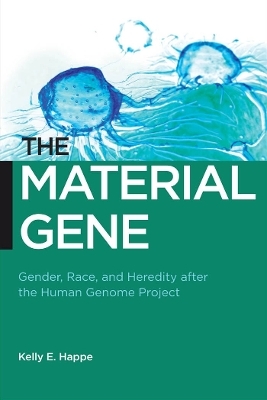
The Material Gene
Gender, Race, and Heredity after the Human Genome Project
Seiten
2013
New York University Press (Verlag)
978-0-8147-9068-7 (ISBN)
New York University Press (Verlag)
978-0-8147-9068-7 (ISBN)
Situates contemporary genomics within a history of genetics research yet is attentive to the new ways in which knowledge claims about heredity, race, and gender emerge and are articulated
Winner of the 2014 Diamond Anniversary Book Award
Finalist for the 2014 National Communications Association Critical and Cultural Studies Division Book of the Year Award
In 2000, the National Human Genome Research Institute announced the completion of a “draft” of the human genome, the sequence information of nearly all 3 billion base pairs of DNA. Since then, interest in the hereditary basis of disease has increased considerably. In The Material Gene, Kelly E. Happe considers the broad implications of this development by treating “heredity” as both a scientific and political concept. Beginning with the argument that eugenics was an ideological project that recast the problems of industrialization as pathologies of gender, race, and class, the book traces the legacy of this ideology in contemporary practices of genomics. Delving into the discrete and often obscure epistemologies and discursive practices of genomic scientists, Happe maps the ways in which the hereditarian body, one that is also normatively gendered and racialized, is the new site whereby economic injustice, environmental pollution, racism, and sexism are implicitly reinterpreted as pathologies of genes and by extension, the bodies they inhabit. Comparing genomic approaches to medicine and public health with discourses of epidemiology, social movements, and humanistic theories of the body and society, The Material Gene reworks our common assumption of what might count as effective, just, and socially transformative notions of health and disease.
Winner of the 2014 Diamond Anniversary Book Award
Finalist for the 2014 National Communications Association Critical and Cultural Studies Division Book of the Year Award
In 2000, the National Human Genome Research Institute announced the completion of a “draft” of the human genome, the sequence information of nearly all 3 billion base pairs of DNA. Since then, interest in the hereditary basis of disease has increased considerably. In The Material Gene, Kelly E. Happe considers the broad implications of this development by treating “heredity” as both a scientific and political concept. Beginning with the argument that eugenics was an ideological project that recast the problems of industrialization as pathologies of gender, race, and class, the book traces the legacy of this ideology in contemporary practices of genomics. Delving into the discrete and often obscure epistemologies and discursive practices of genomic scientists, Happe maps the ways in which the hereditarian body, one that is also normatively gendered and racialized, is the new site whereby economic injustice, environmental pollution, racism, and sexism are implicitly reinterpreted as pathologies of genes and by extension, the bodies they inhabit. Comparing genomic approaches to medicine and public health with discourses of epidemiology, social movements, and humanistic theories of the body and society, The Material Gene reworks our common assumption of what might count as effective, just, and socially transformative notions of health and disease.
Kelly E. Happe is Associate Professor in the Department of Communication Studies and the Institute for Women's Studies at the University of Georgia. She is the author of The Material Gene: Gender, Race, and Heredity After the Human Genome Project and co-editor of Biocitizenship: The Politics of Bodies, Governance, and Power.
ContentsAcknowledgments ixPreface xiii1 Ideology and the New Rhetoric of Genomics 12 Heredity as Ideology: Situating Genomics Historically 233 Genomics and the Reproductive Body 614 Genomics and the Racial Body 1015 Genomics and the Polluted Body 1396 Toward a Biosociality without Genes 177Notes 189Bibliography 243Index 273About the Author 288
| Reihe/Serie | Biopolitics |
|---|---|
| Verlagsort | New York |
| Sprache | englisch |
| Maße | 152 x 229 mm |
| Gewicht | 408 g |
| Themenwelt | Informatik ► Weitere Themen ► Bioinformatik |
| Naturwissenschaften ► Biologie ► Genetik / Molekularbiologie | |
| Sozialwissenschaften ► Ethnologie | |
| Sozialwissenschaften ► Soziologie | |
| ISBN-10 | 0-8147-9068-2 / 0814790682 |
| ISBN-13 | 978-0-8147-9068-7 / 9780814790687 |
| Zustand | Neuware |
| Haben Sie eine Frage zum Produkt? |
Mehr entdecken
aus dem Bereich
aus dem Bereich
Internationale statistische Klassifikation der Krankheiten und …
Buch | Softcover (2023)
Deutscher Ärzteverlag
24,98 €
Operationen- und Prozedurenschlüssel; Internationale Klassifikation …
Buch | Softcover (2023)
Deutscher Ärzteverlag
24,98 €


